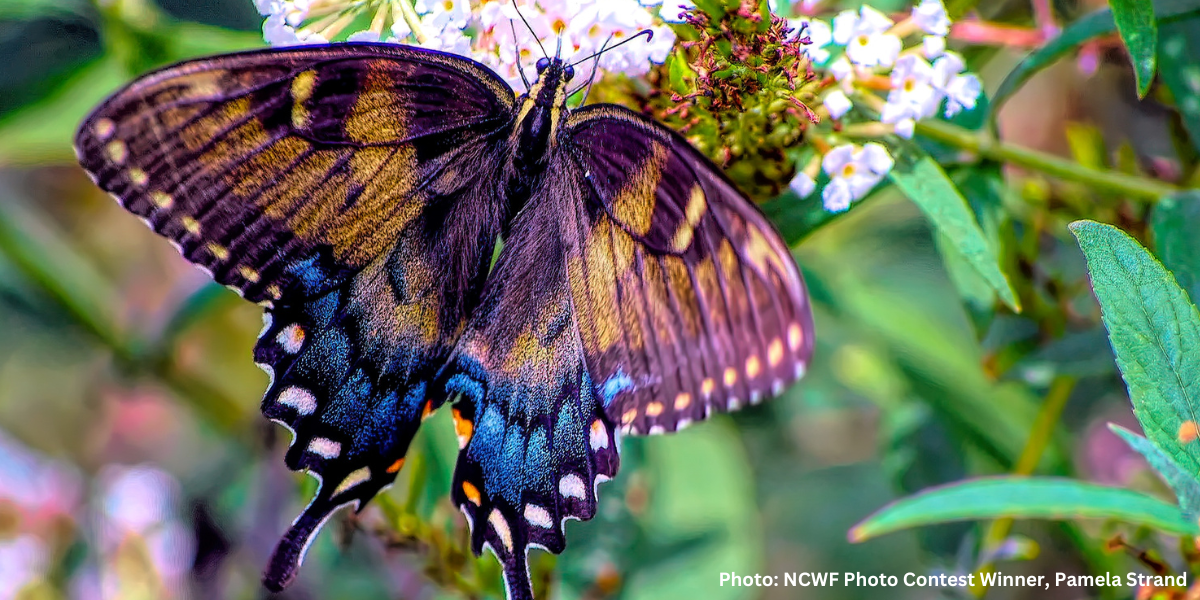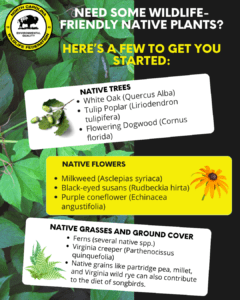Wildlife Resolutions: 5 Powerful Ways to Make A New Year’s Impact for NC Wildlife

What are your resolutions for this new year?
The arrival of a new year is always a bustling and hectic time, yet undoubtedly a period for celebration. People come together in their homes and common areas, staying up well past midnight to welcome the incoming year. People gather in Times Square or in front of their televisions to watch the ball drop, eliciting cheers from millions, and people embrace their loved ones in a gesture of gratitude and hope for the year to come.
While this day of celebration holds great significance for us, it carries little weight for wildlife. They persist in their day-to-day habits and routines, with little changing as a result of this day of global celebration. However, our hope this year is that this new year will be a monumental one for wildlife… through your contribution!
This new year, we encourage you reflect on the impact you can have on wildlife and their habitats. Perhaps consider making a New Year’s resolution dedicated to wildlife.
There are numerous ways to make your resolution for wildlife for the new year. Here are some ideas.
Wildlife Resolutions – Garden for Wildlife
 Whether you possess a small side-yard plot, vast acreage, or just a few potted plants on your apartment windowsill, you can significantly contribute to providing food, water, and habitat for the wildlife in your community. The age-old adage holds true: if you build it, they will come. By offering native plants as food and cover, clean water, shelter from the elements, and spaces for raising young, wildlife will view your yard or garden as a safe haven. Your natural space will then reap the rewards of abundant life and the beauty of natural vibrancy. Numerous non-regulatory, easily implemented practices can be employed on your land for the betterment of wildlife.
Whether you possess a small side-yard plot, vast acreage, or just a few potted plants on your apartment windowsill, you can significantly contribute to providing food, water, and habitat for the wildlife in your community. The age-old adage holds true: if you build it, they will come. By offering native plants as food and cover, clean water, shelter from the elements, and spaces for raising young, wildlife will view your yard or garden as a safe haven. Your natural space will then reap the rewards of abundant life and the beauty of natural vibrancy. Numerous non-regulatory, easily implemented practices can be employed on your land for the betterment of wildlife.
Not sure where to start? Learn more here!
Sign Up To Receive NC Wildlife Updates
Being an active participant in the protection, conservation, and restoration of wildlife in North Carolina means staying up to date on the issues they’re facing. You can sign up to receive news and updates about wildlife topics you care about, from Save Our Sounds to Red Wolves to Butterfly Highway and beyond!
Head to our email signup page and choose which email updates you would like to receive. And while you’re at it, consider joining our Red Wolf text group to ensure that you get timely updates on updates around Red Wolf Recovery! Text the word REDWOLF to 866-417-1870 to join.
Wildlife Resolutions – Plant Butterfly Highway Seeds
A simple step towards gardening for wildlife is planting Butterfly Highway wildflower seeds. Pollinators, especially native bees and migrating species like monarch butterflies, are facing population decline due to habitat loss, pesticide use, and diseases. By planting a Butterfly Highway seed pack, you provide critical nectar sources to pollinators during the spring season. One packet of native seeds offers seven different types of native flowering plants, creating up to 25 square feet of habitat. The seed variety includes purple coneflowers, milkweed, black-eyed Susans, and more. Seeds are best sown from September to January for spring blooms and should be planted within a year of purchase for optimal results.
Buy your Butterfly Highway seed packs now!
Wildlife Resolutions – Leave the Leaves
Solitary insect species, such as leafcutter bees, praying mantises, mud daubers, and carpenter bees, lack the warmth and luxury of a colony during the winter season. They seek out confined spaces for solitary diapause (insect hibernation), such as burrows just under the soil surface, hollow plant stems, and layers of leaf matter. Landowners are encouraged to “leave the leaves” during these critical periods to support insect and pollinator hibernation. Forcing them out of their shelters can result in injury or death. If you can’t commit to leaving leaves in your entire yard, try dedicating a quarter of your yard, yard edges, or a small corner to this wildlife-friendly practice. Want to learn more?
Check out this fall 2022 NCWF blog.
Wildlife Resolutions – Become A Monthly Donor
Creating a significant impact for wildlife requires a community of individuals willing to raise their voices, get their hands dirty, and contribute resources. Financial resources play a crucial role in protecting, conserving, and restoring wildlife and habitats. By becoming a monthly donor, you join others pledging to contribute regularly to NCWF’s efforts across the state. Your donation supports conservation policy work, native tree plantings, trash cleanups, invasive species removal, community organizing, and more. Interested in becoming a monthly donor?
Commit online today!.
Wildlife Resolutions – Leave A Legacy for Wildlife in Your Will or Estate Plan
Financial resolutions are common New Year’s resolutions, but estate planning often gets overlooked. Estate planning involves more than creating a will or designating beneficiaries; it’s about accounting for all your assets and ensuring a seamless transfer to those you care about. It’s never too early or too late to start, and consulting with an estate attorney is advisable. When drafting your will or estate plan, consider creating a lasting legacy for wildlife by including a gift to NCWF and North Carolina’s wildlife. Taking action now ensures your legacy extends beyond your lifetime, supporting the causes dear to you and preserving the beauty of North Carolina’s wildlife and habitats. Whether you prefer to remain anonymous or proudly join NCWF’s Legacy Society, your commitment signifies that you consider NCWF a part of your family, fueling our unwavering dedication to protecting, conserving, and restoring wildlife and habitats in North Carolina.
Have questions? Contact NCWF VP of Philanthropy and Communications Kate Greiner at kate@ncwf.org.
Written by:

– Bates Whitaker, NCWF Communications & Marketing Manager

